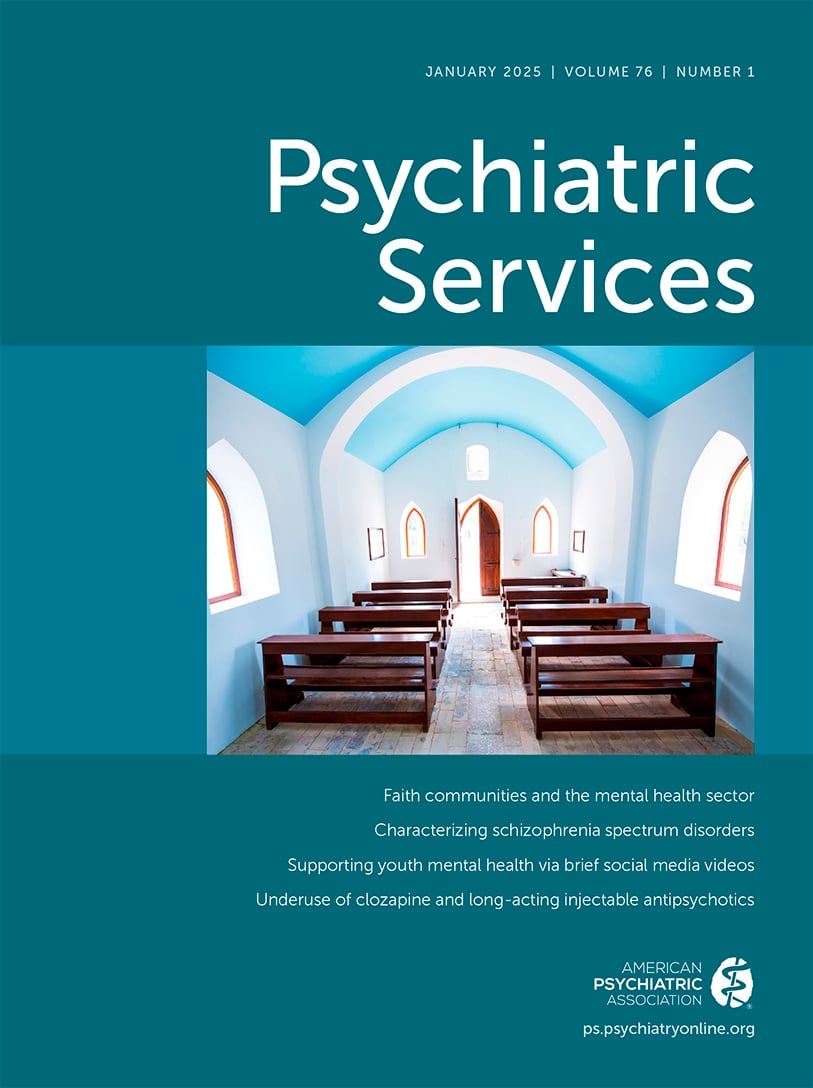Psychiatric Services
- Volume 73
- Number 12
- December 2022
Taking Issue
Viewpoint
Articles
Publication date: 12 August 2022
Pages1322–1329Objective: Involuntary psychiatric treatment may parallel ethnoracial inequities present in the larger society. Prior studies have focused on restraint and seclusion, but less attention has been paid to the ...
https://doi.org/10.1176/appi.ps.202100342Publication date: 16 June 2022
Pages1330–1337Objective: The authors sought to characterize the 3-year prevalence of mental disorders and nonnicotine substance use disorders among male and female primary care patients with documented opioid use disorder across large U.S. health systems. Methods: This ...
https://doi.org/10.1176/appi.ps.202100665Publication date: 12 August 2022
Pages1338–1345Objective: The study examined racial-ethnic disparities in access to and utilization of treatment for attention-deficit hyperactivity disorder (ADHD) and other psychiatric diagnoses among children with ADHD. Methods: Nationally representative, cross-...
https://doi.org/10.1176/appi.ps.202100578Publication date: 16 June 2022
Pages1346–1351Objective: In 2014, the number of coordinated specialty care (CSC) programs in the United States greatly expanded. The proliferation of CSC programs was likely due in part to the availability of Mental Health Block Grant (MHBG) set-aside funds for ...
https://doi.org/10.1176/appi.ps.202100600Publication date: 23 June 2022
Pages1352–1358Objective: This study aimed to use a large population-based sample to investigate age-associated differences in mental distress among sexual and gender minority (SGM) adults compared with their heterosexual, cisgender counterparts. Methods: Data were pooled ...
https://doi.org/10.1176/appi.ps.202100059Publication date: 09 June 2022
Pages1359–1366Objective: Little is known about the factors African American parents consider when seeking care for their child after emotional and behavioral difficulties emerge. This study aimed to examine factors associated with seeking professional care within 30 ...
https://doi.org/10.1176/appi.ps.202100553Publication date: 25 May 2022
Pages1367–1372Objective: The recovery paradigm in the context of serious mental illnesses pertains to several characteristics of community functioning, adjustment, and integration, among other constructs. Additional rating scales would be beneficial for measuring ...
https://doi.org/10.1176/appi.ps.202000545Publication date: 02 June 2022
Pages1373–1379Objective: The authors examined the extent to which clients served by first-episode psychosis programs reflected the racial composition of the surrounding service area and, to the extent that they did not, explored possible explanatory factors. Methods: As ...
https://doi.org/10.1176/appi.ps.202100587Special Articles
Publication date: 30 June 2022
Pages1380–1388Relapse after first-episode psychosis (FEP) is a major clinical challenge for specialized early intervention services. Understanding patient perspectives on factors contributing to relapse can inform the development of risk assessments and preventive ...
https://doi.org/10.1176/appi.ps.202000641Brief Reports
Publication date: 23 June 2022
Pages1389–1392Objective: The authors examined how the COVID-19 pandemic affected the behavioral health of people with intellectual and developmental disabilities (IDD). Methods: A modified version of the Coronavirus Health Impact Survey–Adapted for Autism and Related ...
https://doi.org/10.1176/appi.ps.202100524Publication date: 02 June 2022
Pages1393–1396Objective: The authors examined the use of Veterans Affairs Video Connect (VVC) for mental health care by rural and urban veterans and the impact of the COVID-19 pandemic on patterns of VVC use. Methods: Data from 557,668 rural and 1,384,093 urban veterans (...
https://doi.org/10.1176/appi.ps.202100363Publication date: 17 May 2022
Pages1397–1400Objective: This study assessed the relationship between community behavioral health service (CBHS) use and criminal recidivism in a broad sample of potential beneficiaries and by diagnostic group. Methods: Among a cohort of people on probation with any ...
https://doi.org/10.1176/appi.ps.202100530Publication date: 30 August 2022
Pages1401–1404Objective: The authors aimed to examine racial-ethnic differences in filled psychotropic prescriptions among a pediatric Medicaid population. Methods: This retrospective cohort study included patients ages 0–21 with at least one North Carolina Medicaid claim ...
https://doi.org/10.1176/appi.ps.202100473Publication date: 27 July 2022
Pages1405–1408Objective: The study followed up with peer support specialists (PSSs) responding to an earlier survey to assess the pandemic’s continued employment and personal effects. Methods: A December 2020 online survey was conducted with respondents to a May 2020 ...
https://doi.org/10.1176/appi.ps.202100718Open Forum
Publication date: 02 June 2022
Pages1409–1411Millions of people are incarcerated every year in the United States, many of whom have mental disorders and substance use disorders. Alongside the considerable churn of people into and out of U.S. jails and prisons, numerous barriers often impede ...
https://doi.org/10.1176/appi.ps.202200041Datapoints
Personal Accounts
Promoting High-Value Mental Health Care
Publication date: 02 June 2022
Pages1416–1419Duration of untreated psychosis (DUP), the period between psychosis onset and entry into care, is a time of great vulnerability. Longer DUP predicts poorer outcomes, and delayed treatment access can limit the effectiveness of coordinated specialty care (...
https://doi.org/10.1176/appi.ps.202100374Integrated Care
Publication date: 23 June 2022
Pages1420–1423Effective October 2018, North Carolina Medicaid approved reimbursement for collaborative care model (CoCM) billing codes. From October 2018 through December 2019, only 915 of the estimated two million eligible Medicaid beneficiaries had at least one CoCM ...
https://doi.org/10.1176/appi.ps.202200027Lived Experience Inclusion & Leadership
Publication date: 11 May 2022
Pages1424–1427The definitions of the roles of peer support workers (PSWs) are unclear, creating one of the main challenges to PSWs’ successful involvement in mental health care. In this empirical qualitative study conducted in the Czech Republic, four common roles of ...
https://doi.org/10.1176/appi.ps.202100566Frontline Reports
Appreciation
Other Items of Interest
Past Issues
View Issues Archive
Vol. 76 | No. 2

Vol. 76 | No. 1

Vol. 75 | No. 12
